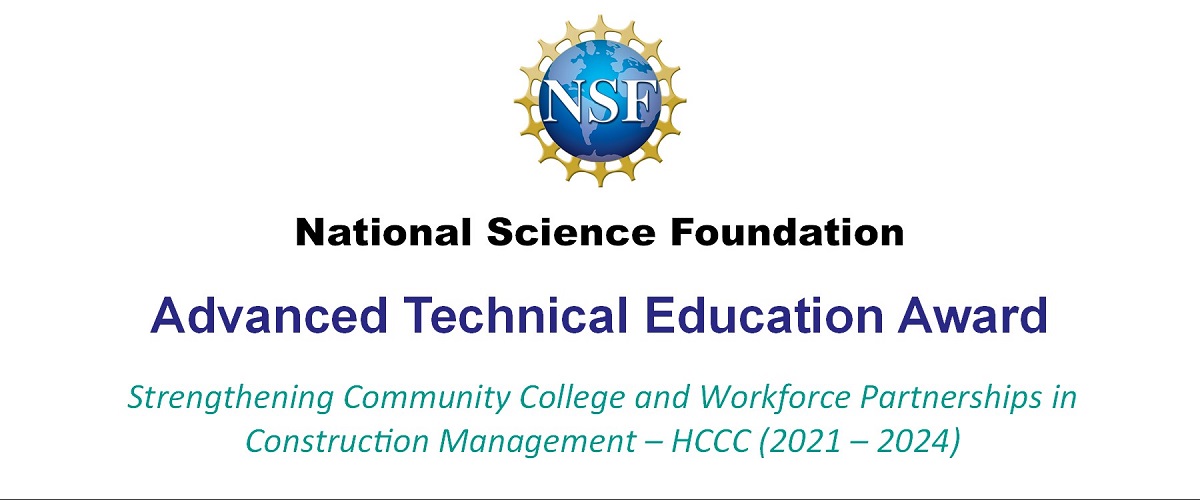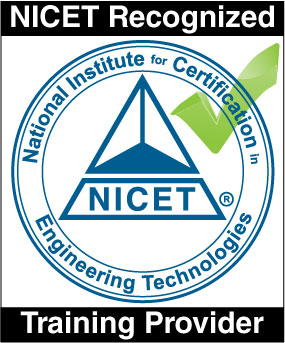
NICET Highway Construction Inspection Certificate Preparatory Courses

HCCC is proud to announce the Construction Management program has received an Advanced Technology Education grant award of $300,000 from the National Science Foundation (NSF).

These courses prepare students for the National Institute of Certified Engineers and Technicians (NICET) Level I, II, & III Certifications, a nationally recognized and industrywide accepted program in the field of Highway Construction Inspection. The NICET Certifications are required mainly by local and state jurisdictions, as well as by federal agencies. The National Institute of Certified Engineers and Technicians has recognized our institution as a recognized training provider for NICET Certifications.
We recognize that training comes in many forms, companies and agencies have different resources, and individuals have different learning styles. This prep program will help in measuring the competency of and layout career paths for engineering technicians and supply industries and employers with a more highly skilled workforce. The intent of this prep program is to equip students with the understanding and skills needed to achieve the NICET Certification in the field of Highway Construction.
These courses will help students in envisioning the understanding of the safety, sustainability, and environmental aspects of today’s modern construction.
The courses bridge the existing gap between theoretical knowledge and field realities. They analyze and discuss the construction industry's needs and responds to the challenges the industry faces by designing and maintaining certification programs to promote the necessary technical skills and knowledge through a fast-track schedule.
Due to continuous evolving trends in the construction industry, the market demands high-quality skilled and knowledgeable technicians. To meet the market’s high demand, these courses provide students an option of meeting this high market demand.
NICET Certification Information
NICET Certification is one of the most prestigious, and extensive, vocational tests conducted across the United States of America for professionals in the Highway Construction Industry. Certification often influences hiring, retention, promotion, and contracting decisions. It is equally beneficial for employers as it is for the employees.
The National Institute for Certification in Engineering Technologies (NICET), a division of the National Society of Professional Engineers, promotes excellence in engineering technologies via certification services. To meet the required qualifications for the evolving changes in construction, it is necessary that construction management professionals are equipped with the tools to help them successfully meet the technical areas involved in modern construction trends. In general, NICET certification creates a pool of multiple opportunities and high-paying jobs at higher designations for technicians in different areas of expertise like Highway construction and many others.
The National Institute of Certified Engineering Technicians (NICET) offers certifications in multiple areas at a different level of academic/experience levels related to a Civil Engineering Technology Program; The following are the major work areas where certification programs are offered:
Construction Materials Testing:
Asphalt, Concrete & Soils
NICET Certified Technicians are defined as “hands-on” members of the engineering team who work under the direction of Engineers, Scientists, and Technologists. They have knowledge of the components, operating characteristics, and limitations of engineering systems and processes particular to their area of specialization.
NICET Level I, II & III Highway Construction Inspection Certificate Prep Course
Student Learning Objectives/Outcomes
- Develop a basic knowledge and concepts related to inspection of Highway Construction
- Identify the problems and their causes
- Apply mitigation techniques and newly developed procedures and practices
- Recognize an inspector's duties for providing a quality and safe roadway
- Interpret the behavior of construction material from test results
Training and Course Objectives
Plans and Specifications:
- Understand and interpret plans and drawings
- Common construction terminologies
- Documents required for construction
- Scope statement schedule budget requirements quality criteria project resources stakeholder list communication plan
- Construction Standards AASHTO ASTM ACI OSHA
Measurement and Surveys:
- Units & their conversions
- Arithmetic calculations involve length
- area volume weight mass temperature pressure strength
Tools and Equipment:
- Identify tools & equipment used by inspectors testing and reporting
- Tools and equipment used by surveyors
- Tools & equipment used in construction
Personal Safety:
- Use of PPE for the construction site
- Identify and report potential safety hazards
- Identify sources of safety information and requirements
Site Operations:
- Identify components of work zone traffic control
- Identify construction activities
Environmental Issues:
- Identify and verify the presence of erosion and sediment control components
Utilities:
- Identification types their layouts and markings the process before you dig
Student Learning Objectives/Outcomes
- Develop a basic knowledge and concepts related to inspection of Highway Construction
- Identify the problems and their causes
- Apply mitigation techniques and newly developed procedures and practices
- Recognize an inspector's duties for providing a quality and safe roadway
- Interpret the behavior of construction material from test results
Training and Course Objectives
Earthwork (Excavation; Classified & Unclassified)
- Visually identify soil and aggregate types and their properties
- Identify and differentiate between limits of disturbance
- Rights-of-way and easement
- Inspect clearing grubbing inspect temporary erosion and sediments controls and storm water management components
- Recognize materials testing certification and acceptance requirements Construction Standards AASHTO ASTM ACI oshasite
Asphalt Pavement Construction:
- Inspect existing surface preparation as required Inspect the application of tack coat Conduct preplacement inspection
- Grade control equipment pre-checks and paving plan review Visually identify asphalt mixes and properties
- Calculate and interpret yield inspect delivery placement compaction and finishing of asphalt
Concrete Pavement Construction:
- Inspect surface preparation forms reinforcing steel and load-transfer assemblies for pavement
- Verify that correct procedures are followed for sampling fresh concrete; measuring temperature determining slump
- Air content unit weight and yield and making and curing test specimens
Concrete Structure Construction:
- Inspect delivered precast box culverts
- Box beams and other precast items
- Inspect bedding and installation of footing and basic driven piles
- Inspect delivery and method of placement of concrete for structures
- Identify drainage system components
- Inspect excavation for drainage system
- Inspect bedding and backfilling
- Inspect installation of drainage components
Utilities and Incidental Construction:
- Identify utility facilities affected by construction
- Inspect signage striping and message marking
- Inspect guard rails safety systems and fencing
- Inspect basic foundations for lighting traffic signals ground mounted signs and sound walls
- Inspect underground electrical conduit
- Inspect sidewalks curbs and gutters curb ramps median/median barriers and driveways.
Site Layouts & Controls:
- Use survey notes and data to verify elevations
- Inspect placement of work zone traffic controls
- Including lane shifts closures detours and construction access points and routes
Responsibilities & documentation:
- Generate and maintain project documentation related to work within the inspector’s scope of responsibility
- Identify project roles hierarchies and responsibilities including the authority of the inspector
- Identify project activities from a project schedule
- Identify and inspect required work-site postings
Student Learning Objectives/Outcomes
Review and Interpret contract erection shop drawings
- Identify problems/errors and their causes
- Apply safety standards and codes and their enforcement
- Recognize the duties of an inspector for the provision of the quality product to the client
- Use tools and techniques for compliance of contract documents
Training and Course Objectives
Soil & Slope Stabilization
- Inspect roadway soil stabilization steep slopes and slope stabilization both temporary & permanent including support of excavation water retention and channeling features
- Installation of permanent geosynthetics and geogrids
- Reinforced earth and mechanically stabilized embankment and walls
- Evaluate field conditions relative to core borings
- Inspect ground improvement procedures
- Construction Standards AASHTO ASTM ACI OSHA
Roadway Construction:
- Inspect pavement preservation application
- Application for concrete and asphalt roadways grade tie-line drainage elevations and transition for proper functionality through all phases of construction
- Inspection of sanitary sewer lines water lines
- Identify potential improvements to work zone traffic control implementation
Structure Construction:
- Inspect drilled shafts caissons and shallow foundations steel structural components and conformance with erection plans
- Verify size and type of structural steel connections
- Inspect implementation of thermal control plans for mass concrete
- Inspect the delivered condition and handling of pre-stressed concrete beams boxes and piles
- Inspect post-tensioning of concrete components
Traffic Signals:
- Inspect erection of structures for signals signage and lighting loops and other detection devices for traffic signals and intelligent transportation systems
Lighting & ITS:
- Inspect installation of components and wiring for signals and other traffic management systems and verify functionality
- Inspect installation of components and wiring for lighting and verify functionality
Reporting & Compliance:
- Review inspection reports from staff for completeness and content and report work results non-conformances and actions taken
- Prioritize and coordinate inspection activities of available inspection personnel
- Verify that temporary erosion and sediment controls and storm water management components are functioning adequately
- Inspect project activities for conformance with basic OSHA safety requirements
NICET Level 1 Certifications (Preparatory Course)
ONLINE COURSE
No Prerequisites Required
Total Hours: 32
Mondays and Wednesdays
6:30 p.m. - 9:30 p.m. EDT
$375.00
NICET Level 2 Certifications (Preparatory Course)
ONLINE COURSE
No Prerequisites Required
Total Hours: 32
Mondays and Wednesdays
6:30 p.m. - 9:30 p.m. EDT
$375.00
NICET Level 3 Certifications (Preparatory Course)
ONLINE COURSE
No Prerequisites Required
Total Hours: 32
Mondays and Wednesdays
6:30 p.m. - 9:30 p.m. EDT
$375.00
For more information and registration, please email Alexis Muniz at amunizFREEHUDSONCOUNTYCOMMUNITYCOLLEGE.
Contact Information
Office of Continuing Education
161 Newkirk Street, Room E504
Jersey City, NJ 07306
(201) 360-4224
CEFREEHUDSONCOUNTYCOMMUNITYCOLLEGE